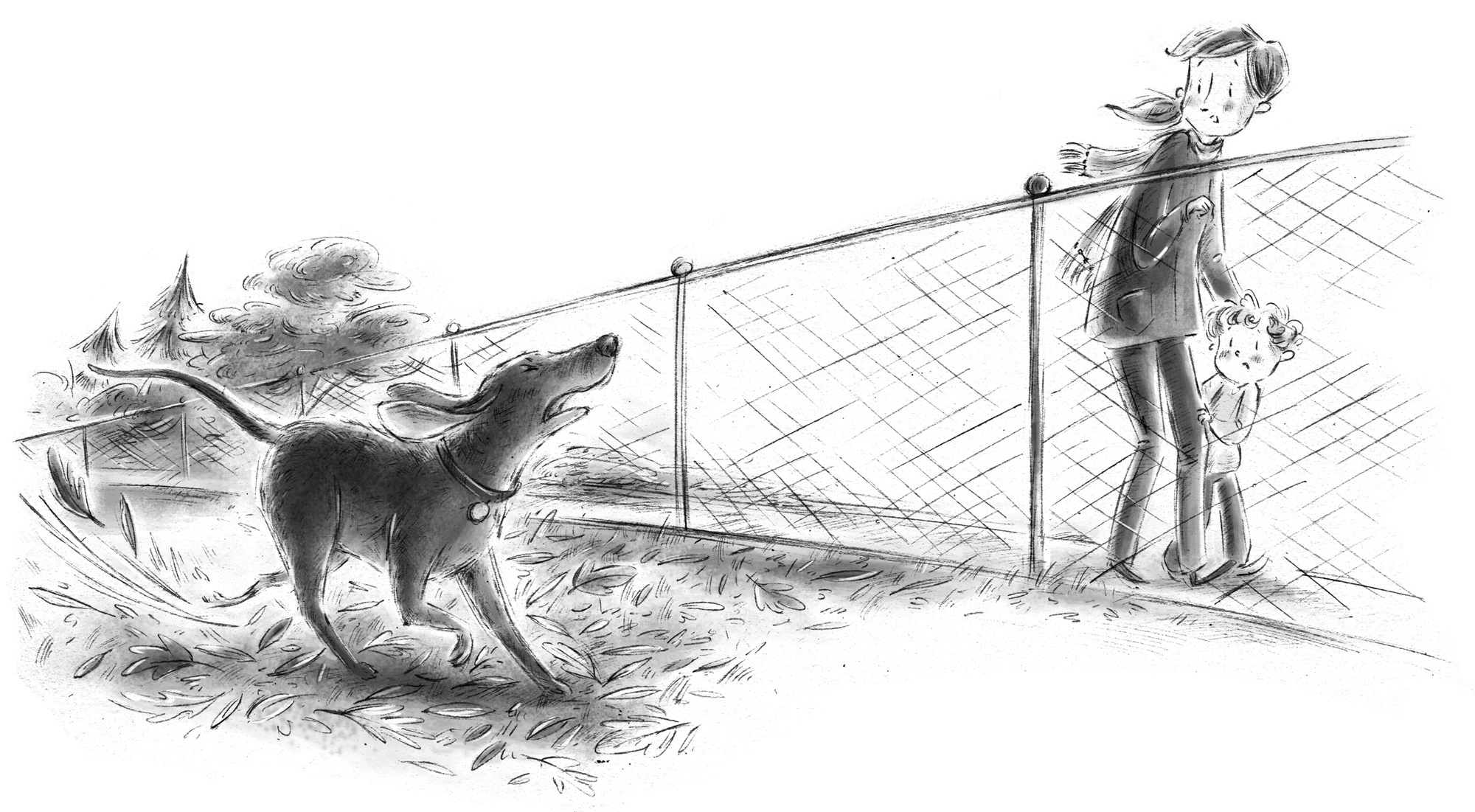

Gus was the meanest dog in town.
Everyone said so.
He lived
in the green yard
belonging to a small tan house
on the corner
of Birch and Larpenter Streets.
The post office,
the Piggly Wiggly,
and Joe’s Gas and Grill
sat on the other three corners,
which made Birch and Larpenter
a very busy intersection.
And that made Gus
a very busy dog.
All day
he up down
ran and
his chain-link fence,
barking at every car
that passed by.

He barked at every bicycle,
too.
In fact,
he barked at every cat
and dog
and person
who ran
or walked
or tried to sneak past.
Sometimes he even barked
at the birds
in the trees
just to show them
who was boss.
He curled his lips
to show his long yellow teeth
and growled
and snarled
and yelled.
“Go!
“Get out of here!
Go! Go! Go!”
Not that humans heard
“Go! Go! Go!”
They heard only
“Bark! Bark! Bark!”
But you and I know
what Gus was really saying.
Gus was enormous,
but he wasn’t exactly handsome.
He had long legs
and a skinny tail
and ears that hung down
like limp
w
a
s
h
r
a
g
s.
He had a head
about the size
and the shape
of a shoe box.
He was gray,
the color of the ashes
left behind in your fireplace
after the cheerful fire
has grown cold.
And his coat was coarse
and wiry,
not the least bit soft
to the touch.
Gus wasn’t an orphan.
He had a man,
a woman,
a boy
inside the tan house.
Actually,
he had once lived
inside the tan house
himself.
He’d spent his puppyhood
there,
cheerfully knocking over vases,
putting his paws
on the shoulders
of visiting grandmothers,
and gulping
every bit of food
he could get
his mouth
around.
And what Gus could manage
to fit into his enormous mouth
was truly amazing.
Once
he rested his chin
on the dining room table
and ate
a huge steak,
three baked potatoes,
a green salad,
and an ear of corn
without pausing
to take
a breath.
(It was when he stopped
to spit out the cob
that he got caught.)
And it didn’t help
that when one of his humans said,
“Sit!”
Gus got a look in his eye
that said,
Who, me?
or that when they said,
“Stay!”
he galloped away
and
ran
all around
the
house.
Then
there was that other problem.
I don’t like to mention it,
but the truth was . . .
Gus smelled.
And when I say he smelled,
you will understand
he did not smell
like roses
or like baking bread
or like any of the many scents
we all welcome
when we walk
into a house.
He smelled—
no doubt about it!—
like dog,
a large
and rather dirty
dog.
And yes,
I hear your question.
“Hadn’t anyone ever thought
of giving the poor thing
a bath?”
If only the problem
could be solved
so easily.
You see,
the man,
the woman,
and the boy
had tried,
more than once,
to bathe Gus.
But Gus was so big
and the tub so small
and the water so wet that . . .
well,
let me explain it this way.
Imagine the damage
an enormous dog
might do
galloping
merrily
through a small house.
Then consider
what an enormous, wet, muddy, soapy dog
might accomplish
careening
through the same small space.
So perhaps
when you consider all Gus’s faults
you’ll understand
why the man finally declared
that Gus must
never,
ever,
ever
come inside the house
again.
You might think the man hardhearted—
the boy did—
but even the woman agreed.
“Some dogs are not meant
for inside,”
she said.
Which was why Gus
lived in the green yard
and spent his days
running along the chain-link fence
shouting, “Go! Go! Go!”
It was also why
he’d turned
sad
and angry . . .
and,
let’s face it,
rather mean.
Gus didn’t mind
that the town thought he was mean.
In fact,
he had grown rather proud
of his fierce reputation.
Proud of the way
a dash at the fence
with his bark blaring
could make folks decide,
quite suddenly,
to cross the street
(pretending
as they hurried away
that across the street
was where they had meant to go
all along).
And so,
when Gus saw
a small calico cat
marching toward him
with her tail high,
as though she owned the whole town,
he took his job
as the protector of his corner—
not to mention his reputation
as the meanest dog in town—
very seriously.
“Go!”
he shouted.
“Get away from here,
right now!
Go! Go! Go!”
The little cat
kept right on coming.